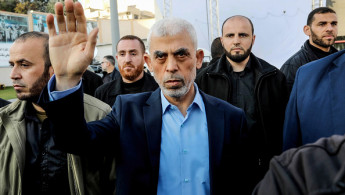Hamas chief Yahya Sinwar: Israel claims it has killed its most wanted man
The Israeli military on Thursday announced the killing of Hamas leader Yahya Sinwar by its forces in southern Gaza the previous day.
Hamas has yet to acknowledge Sinwar's death, which is common when one of its high-ranking officials is killed.
After a career in the shadows, spent in Israeli prisons and the internal security apparatus of Hamas, Yahya Sinwar emerged as the leader of the Palestinian group.
The Israeli military "confirms that after a year-long pursuit, yesterday (Wednesday), October 16, 2024, IDF (military) soldiers from the Southern Command eliminated Yahya Sinwar, the leader of the Hamas terrorist organisation, in an operation in the southern Gaza Strip," it said in a statement.
"The dozens of operations carried out by the IDF and the ISA (Shin Bet internal security agency) over the last year, and in recent weeks in the area where he was eliminated, restricted Yahya Sinwar's operational movement as he was pursued by the forces and led to his elimination," the military added.
"IDF soldiers of the 828th Brigade (Bislach) operating in the area identified and eliminated three terrorists. After completing the process of identifying the body, it can be confirmed that Yahya Sinwar was eliminated".
Sinwar is among the Hamas leaders accused of masterminding the group's surprise attack on Israel on 7 October last year, and is said to have been hiding in a network of tunnels the militants built under Gaza.
Sinwar was the head of Hamas in Gaza, but rose to become the group's overall leader in August after the killing of political chief Ismail Haniyeh who was assassinated by Israel in Tehran on 31 July.
Also in July, Israel said it killed Hamas military leader Mohammed Deif, but the group never confirmed his death.
'Operator par excellence'
Sinwar was a security operator "par excellence", according to Abu Abdallah, a Hamas member who spent years alongside him in Israeli jails.
"He makes decisions in the utmost calm, but is intractable when it comes to defending the interests of Hamas," Abu Abdallah told AFP in 2017, after his former co-detainee was elected Hamas's leader in Gaza.
Born in the Khan Younis refugee camp in southern Gaza, Sinwar joined Hamas when Sheikh Ahmad Yassin founded the group around the time the first Palestinian intifada began in 1987.
Sinwar set up the group's internal security apparatus the following year and went on to head an intelligence unit dedicated to flushing out and mercilessly punishing -- sometimes killing -- Palestinians accused of providing information to Israel.
According to a transcript of an interrogation with security officials published in Israeli media, Sinwar professed to have strangled an alleged collaborator with a keffiyeh scarf in a Khan Younis cemetery.
A graduate of the Islamic University in Gaza, he learned perfect Hebrew during his 23 years in Israeli jails and was said to have a deep understanding of Israeli culture and society.
'Radical and pragmatic'
He was serving four life terms for the killing of two Israeli soldiers when he became the most senior of 1,027 Palestinians released in exchange for Israeli soldier Gilad Shalit in 2011.
Sinwar later became a senior commander in the Qassam Brigades, the military wing of Hamas, before taking overall leadership of the movement in Gaza.
While his predecessor, Haniyeh, had encouraged efforts by Hamas to present a moderate face to the world, Sinwar preferred to force the Palestinian issue to the fore by more violent means amid an increasingly radical Israeli rejection of the peace process and even more violent practice its illegal occupation and siege of Gaza and the West Bank.
Sinwar is said to have strived for a single Palestinian state bringing together the Gaza Strip, the occupied West Bank -- controlled by Mahmud Abbas's Fatah party -- and annexed east Jerusalem.
According to US think-tank the Council on Foreign Relations, he vowed to punish anyone obstructing reconciliation with Fatah, the rival political movement with which Hamas engaged in factional fighting after elections in 2006.
That coming together remains elusive, but the prisoner releases resulting from the brief November truce agreement with Israel saw Hamas's popularity soar in the West Bank.
Sinwar pursued a path of being "radical in military planning and pragmatic in politics", according to Seurat.
"He doesn't advocate force for force's sake, but to bring about negotiations" with Israel, she said.




 Follow the Middle East's top stories in English at The New Arab on Google News
Follow the Middle East's top stories in English at The New Arab on Google News

![A group of Palestinians, foreign and Israeli activists gather to participated in an olive picking event on the land in the town of Battir, which is under threat of confiscation by Israel in Bethlehem, occupied West Bank on 8 November 2024. [Getty]](/sites/default/files/styles/image_330x185/public/2182930803.jpeg?h=199d8c1f&itok=__0LgGsa)
